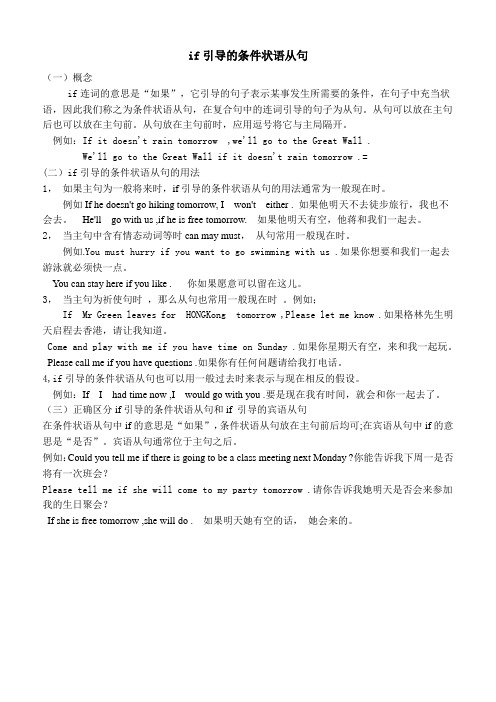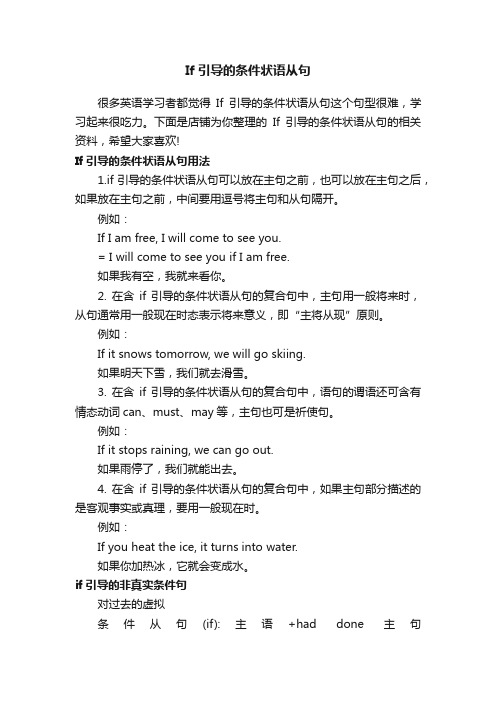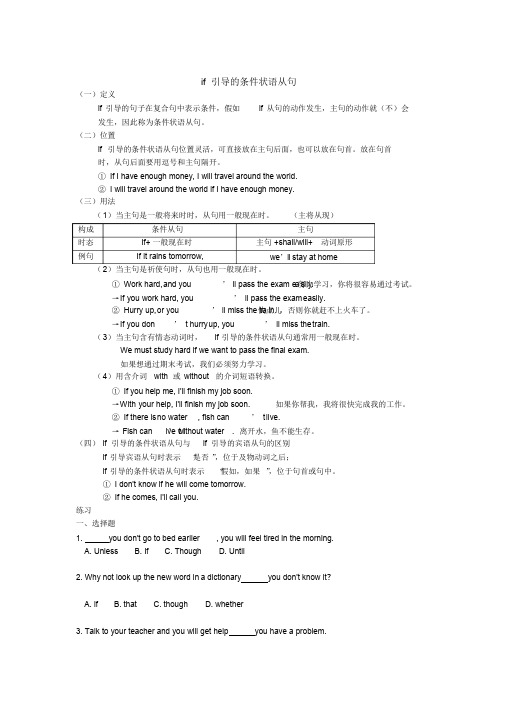if引导的条件状语从句 (2)
if引导的条件状语从句讲解和练习(答案)

t 条件状语从句一、 条件状语从句通常由 if (如果), unless (除非),as long as (只要)引导。
例如:If it rains tomorrow, we won ’go to the park. 如果明天下雨,我们就不去公园了。
Unless weather stops me, I go for a walk every. 我每天都会去散步,除非遇上坏天气。
Our parents will be pleased with our performance as long as we try our best.小试牛刀:1、只要我们竭尽全力,父母就会满意我们的表现。
Our parents will be pleased with our performance _____ _____ ______ we try our best.2、如果人人为保护环境做出贡献,世界将会变得更美好。
______ ______ ______ _____ _______ to protectingthe environment, the world will become much more beautiful.二、if 引导的条件状语从句(1)“if 从句+祈使句”的句子。
其实,if 作为一个连词,主句也可以是其他形式的句子。
例如:If you want to go, please let me know.If the green light isn ’t on, wait for a minute.(2)“祈使句 + and (or)+ 陈述句” 在意思上相当于一个带有条件状语从句的复合句。
注意:A. “祈使句 + and + 陈述句”可以转化为 if 引导的肯定条件状语从句,而且主语是第二人称。
B. “祈使句 + or + 陈述句”可以转化为 if 引导的否定条件状语从句,而且主语是第二人称。
if 引导的条件状语从句

一般现在时。 If you drive too fast, you may have an accident. You must stop if the traffic is red. If you finish the homework, you can go home. 如果你作业做完了就可以回家了。 If you want to lose weight you must/should eat less bread. 如果你想减肥,你必须少吃面包。
if引导的条件状语从句
If条件句:条件句用于陈述语气,表示将来的可能性,能力, 允
诺,命令,要求,请求,建议时,假设的情况可能发生,其中 if 是“假如, 如果”的意思。主句一般将来时 ,从句用一般现在时。
运用“主将从现”的原则。
构 成
条件从句
主句
时 态
If+一般现在时 主语+shall/will+动词原形
if引导的条件状语从句
主从句的时态?
If I get up late, I will be late for school. If I don’t finish my homework, I won’t go to bed. If you join the band(乐队), you will be famous.
• 除非天气不好,我每天早晨都要去散步。
• 3. I won‘t loan you unless you are in extreme need of money.
• 若不是你急需用钱,我不会借钱给你的。
if引导的条件状语从句
Summary(小结)
if 条件句不一般, 几个要点记心间; 条件句,放在前, 逗号要放句中间。 条件句表可能, 主将从现不一般; 条件句表事实, 主句常用现在时。
If 引导的条件状语从句

If 引导的条件状语从句If引导的条件状语从句需要遵循主过从过、主将从现的原则。
例如,如果明天下雨,我就不会去爬山。
如果明天不下雨,我就会和朋友去乡村。
如果你帮我,我就能按时完成。
如果明天天气好,我们可能会出去。
如果你完成了作业,你就可以看电视。
如果你下周日去购物,请给我打电话。
如果我去那里,我会给她带些花。
如果明天下雨,我们会待在家里。
如果他在家,请给我打电话。
如果你更加努力,你就能通过考试。
如果她明天有时间,她会去看望她的爷爷。
如果火车没有准时到达,我们会坐出租车去市区。
如果老师迟到了,他会生气。
除此之外,如果否定形式的if可以转换成肯定形式的unless,例如你如果不努力,你就不能通过考试,可以转换成你除非努力,否则你就不能通过考试。
With your help。
I will be ___.If you wake up early。
you will arrive on time.Wake up early。
or you will be late.If you wake up early。
you won't be late for school.Wake up early。
and you will catch the early bus.1.I will tell you about your friend.Answer: A。
come2.If you go to college。
you will get a good ___. Answer: A。
will get3.I want to know if they will come tomorrow. Answer: B。
will come4.___ exercise。
and you'll be in good health. Answer: D。
and5.If it doesn't rain。
he will play ___.Answer: If it doesn't rain。
知识点名:if引导的条件状语从句

知识点名:if引导的条件状语从句讲义:if引导的条件状语从句1. if意为“如果”,引导条件状语从句时,既可放在主句前面,也可放在主句后面。
若if条件句放在句首,从句后面常加逗号与主句隔开。
If you go there, I'll go, too.如果你去那儿,我也会去。
My mother will take me to the park if she is free.如果我妈妈有空,她就会带我去公园。
2. 时态运用:在含有if引导的条件状语从句的主从复合句中,主句为下列情形之一的,条件状语从句通常用一般现在时。
(1) 主句是一般将来时,即遵循“主将从现”的原则。
If he comes, he will bring his violin.如果他来,他就会把他的小提琴带来。
(2) 主句是含有情态动词may/might/can/must/should等的句子。
If you want to lose weight, you must eat less bread.如果你想减肥,你必须少吃面包。
(3) 主句是祈使句。
If you are not strong enough, please don't take part in such an activity.如果你不是很健壮,请不要参加这种活动。
3. 句型转换:(1) 借助“祈使句+and/or+陈述句(一般将来时)”这一句型来转换。
其中,在句意上and表示顺承;or表示转折,意为“否则”。
If you work hard, you'll pass the exam easily.=Work hard, and you'll pass the exam easily.努力学习,你将很容易通过考试。
Work hard, or you won't pass the exam easily.努力学习,否则你不会轻易地通过考试。
if条件状语从句 课件好用 (2)

Look and say
sunny this Sunday
go fishing .
If it is sunny this Sunday, I’ll go fishing .
P105 B
• William has five problems • Give him some advice from column A and B • 1 I sometimes forget to take the right book to school. • If you check your timetable every night , you’ll know which books to take.
• 2.Water turns into ice if you cool it. • 如果你冷却水,它就会变成冰。 主句 从句 用 (用/不用)逗号隔开 从句在主句前时,____ 当主句在前时,则____ 不用 (用/不用)逗号
If you drop a glass, it breaks.
If you heat ice, it melts.
1. He will help me with my maths if he ____ D free. A was B will be C would be D is 2. I don’t know_____ D he will come tomorrow.____ he comes, I’ll tell you. A if; Whether B whether; Whether C if; That D if ; If 3. Please tell her my telephone number wants (want) to know. if she _____
if引导的条件状语从句

if引导的条件状语从句(一)概念if连词的意思是“如果”,它引导的句子表示某事发生所需要的条件,在句子中充当状语,因此我们称之为条件状语从句,在复合句中的连词引导的句子为从句。
从句可以放在主句后也可以放在主句前。
从句放在主句前时,应用逗号将它与主局隔开。
例如:If it doesn't rain tomorrow ,we'll go to the Great Wall .We'll go to the Great Wall if it doesn't rain tomorrow .=(二)if引导的条件状语从句的用法1,如果主句为一般将来时,if引导的条件状语从句的用法通常为一般现在时。
例如If he doesn't go hiking tomorrow, I won't either . 如果他明天不去徒步旅行,我也不会去。
He'll go with us ,if he is free tomorrow. 如果他明天有空,他蒋和我们一起去。
2,当主句中含有情态动词等时can may must,从句常用一般现在时。
例如.You must hurry if you want to go swimming with us .如果你想要和我们一起去游泳就必须快一点。
You can stay here if you like . 你如果愿意可以留在这儿。
3,当主句为祈使句时,那么从句也常用一般现在时。
例如;If Mr Green leaves for HONGKong tomorrow ,Please let me know .如果格林先生明天启程去香港,请让我知道。
Come and play with me if you have time on Sunday .如果你星期天有空,来和我一起玩。
Please call me if you have questions .如果你有任何问题请给我打电话。
If引导的条件状语从句

If引导的条件状语从句很多英语学习者都觉得If引导的条件状语从句这个句型很难,学习起来很吃力。
下面是店铺为你整理的If引导的条件状语从句的相关资料,希望大家喜欢!If引导的条件状语从句用法1.if引导的条件状语从句可以放在主句之前,也可以放在主句之后,如果放在主句之前,中间要用逗号将主句和从句隔开。
例如:If I am free, I will come to see you.= I will come to see you if I am free.如果我有空,我就来看你。
2. 在含if引导的条件状语从句的复合句中,主句用一般将来时,从句通常用一般现在时态表示将来意义,即“主将从现”原则。
例如:If it snows tomorrow, we will go skiing.如果明天下雪,我们就去滑雪。
3. 在含if引导的条件状语从句的复合句中,语句的谓语还可含有情态动词can、must、may等,主句也可是祈使句。
例如:If it stops raining, we can go out.如果雨停了,我们就能出去。
4. 在含if引导的条件状语从句的复合句中,如果主句部分描述的是客观事实或真理,要用一般现在时。
例如:If you heat the ice, it turns into water.如果你加热冰,它就会变成水。
if引导的非真实条件句对过去的虚拟条件从句(if):主语+had done 主句might/would/should/could+have done对现在的虚拟if+ 主语+动词过去式(be用were)主句might/would/should/could+do对将来的虚拟if+主语+动词过去式(be用were)或主语+should do或主语+were to do主句 might/would/should/could+doe.g.Tom got to the station in time because he started earlier.If Tom had started late, he would have missed the train.Do you think the thief entered through the door?No, if he had, I don't believe, he would have broken the living room window.If the book weren't so expensive, I would buy it.If you didn't live so far away, we would be able to visit you more.What would you do if you lost your passport in a foreign country?Why hasn't he come? If he should not come on time, we would have to put off the trip.2.注意事项e.g.If she hadn't work hard at English in the past, she wouldn't work as well as a secretary in a large company now. 混合时间的虚拟语气从句为对过去的虚拟,主句是现在。
if引导的条件状语从句知识点及练习题

(一)定义if 引导的条件状语从句if 引导的句子在复合句中表示条件,假如 if 从句的动作发生,主句的动作就(不)会发生,因此称为条件状语从句。
(二)位置if 引导的条件状语从句位置灵活,可直接放在主句后面,也可以放在句首。
放在句首时,从句后面要用逗号和主句隔开。
① If I have enough money, I will travel around the world. ② I will travel around the world if I have enough money. (三)用法( 1)当主句是一般将来时时,从句用一般现在时。
(主将从现)( 2)当主句是祈使句时,从句也用一般现在时。
① Work hard, and you ’ ll pass the exam e a 努si 力l y.学习,你将很容易通过考试。
→If you work hard, you ’ ll pass the exam e asily.② Hurry up, or you ’ ll miss the 快tr a 点in 儿. ,否则你就赶不上火车了。
→If you don’ t hurry u p, you’ ll miss the train.( 3)当主句含有情态动词时,if 引导的条件状语从句通常用一般现在时。
We must study hard if we want to pass the final exam. 如果想通过期末考试,我们必须努力学习。
( 4)用含介词 with 或 without 的介词短语转换。
① If you help me, I'll finish my job soon. →With your help, I'll finish my job soon. 如果你帮我,我将很快完成我的工作。
② If there is n o water , fish can’ t live.→ Fish caniv ’e w t l i thout water . 离开水,鱼不能生存。
- 1、下载文档前请自行甄别文档内容的完整性,平台不提供额外的编辑、内容补充、找答案等附加服务。
- 2、"仅部分预览"的文档,不可在线预览部分如存在完整性等问题,可反馈申请退款(可完整预览的文档不适用该条件!)。
- 3、如文档侵犯您的权益,请联系客服反馈,我们会尽快为您处理(人工客服工作时间:9:00-18:30)。
1.如果明天不下雨,我就和同学们去野餐。
2.如果周日你去购物的话,我就去。
3.如果你想减肥(loseweight),就锻炼身体吧。
4.如果冬天来了,春天还会远吗
5.如果可能的话,我就去火车站接你。
Key:
’traintomorrow,Iwillhaveapicnicwithmyclassmates.
if引导的条件状语从句
用法
例句
①主句为一般将来时态,if从句用一般
现在时态(即主将从现)。
Wewillstayathomeifitrainstomorrow.
如果明天下雨,我将要呆在家。
②主句中含有情态动词,if从句用一般现在时态。
Ifyoufinishyourhomework,youcangohomenow.如果你做完了作业,你现在可以回家了。
③主句为祈使句,if从句用一般现在时态。
Don’tjumpintotheriverifyoufeelveryhot.如果你感到很热,不要跳入河里。
④主句为过去将来时,if从句用一般过去时态(如果涉及到be动词,一律都用were)。此时,表达的是和现实相反的推测,用虚拟语气。
IfIwer我是你,我就不会那么做的。
Ifyougavemesomemoney,Iwouldbeveryhappy.如果你给我一些钱,我就会很高兴的。
【边学边做】用括号内所给词的正确形式填空。
(have)alotofmoney(notsnow)tomorrow,(be)(be)athomeatthattime,(know)(eat)(be)(work)hard.
